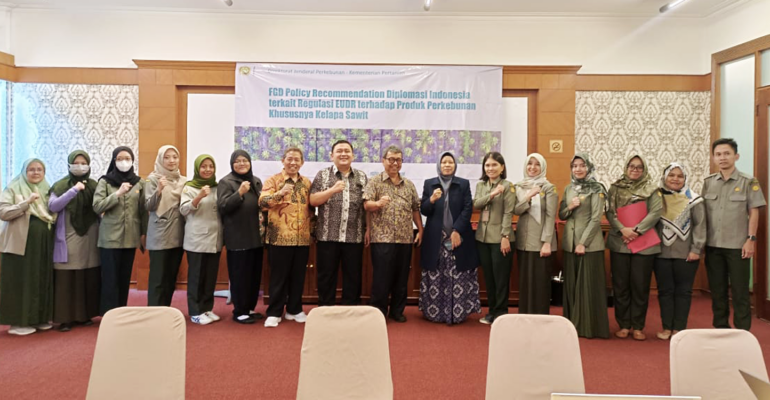IPB University’s Center for Palm Oil Studies Presents Recommendations for Indonesia’s Diplomacy with Brussels and Madrid regarding EUDR

Three IPB University experts from the Center for Palm Oil Studies (Pusdisawit) attended a focus group discussion (FGD) invitation from the Directorate General of Plantations, Ministry of Agriculture to discuss the launch of the European Union’s Deforestation Regulation (EUDR) platform and its impact on plantation products, especially oil palm.
The FGD was attended by various hybrid parties, including the Embassies of Brussels and Madrid, the Ministry of Foreign Affairs, the Ministry of Trade, the National Development Planning Agency (Bappenas), and the Ministry of Environment and Forestry (KLHK).
In this FGD, IPB University experts provided recommendations related to three issues that Indonesia is facing in the trade of seven basic agricultural products in the European Union. The first issue was related to the impact of the launch of the European Union Forest Observatory (EUFO) platform, presented by Dr Suwardi.
The lecturer of the Faculty of Agriculture of IPB University said, “The difference in the definition of forests and deforestation according to the EUFO map and the Ministry of Environment and Forestry has consequences, namely the difficulty of exporting seven commodities, namely palm oil, wood, rubber, cocoa, coffee, soybeans and livestock to the European Union market.”
The second issue, related to the impact of the revised Food Information to Consumers (FIC) regulation on the image of palm oil, was presented by Prof Budi Mulyato, Chairman of Pusdisawit IPB University.
“Educating consumers, especially at the international level, about the content of palm oil products is very important to avoid misconceptions that can affect the world trade in palm oil,” he said.
He added that the Roundtable on Sustainable Palm Oil (RSPO) and Indonesia Sustainable Palm Oil (ISPO) certifications can also be used as a reference to show the quality of palm oil products.
Dr Epi Taufik, lecturer at the Faculty of Animal Sciences, IPB University reviewed the third issue on the impact of the EUDR policy on the use of palm oil by-products in animal feed in Spain. In this session, he discussed how the EUDR regulation also affects the use of animal feed supplements made from palm oil.
“Palm oil contains palmitic acid which turns out to be very useful for increasing the milk production of dairy cows,” said the Dairy Expert of IPB University.
On this occasion, Pusdisawit also submitted a recommendation paper prepared by two other IPB University experts, namely Dr Supijatno and Dr Siti Nikmatin. The FGD results will be followed up by the Ministry of Agriculture and all related parties as a form of Indonesia’s response and its role as the world’s largest palm oil producer. (rfa/Rz) (IAAS/Ard)


